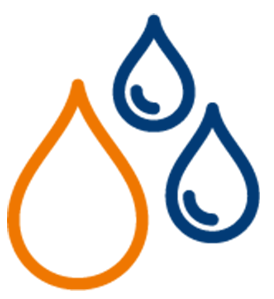NATURAL CAPITAL
Interaction between the PGNiG Group companies and the environment is inherent in the nature of their business. Considering the contemporary challenges to environmental protection, related to the depletion of natural resources and potential contamination of individual environmental components, we are taking measures to minimise the adverse environmental impact. The PGNiG Group recognises its impact on climate change and supports the fight against air pollution.
PGNiG also takes steps to enhance its energy efficiency, one example of these efforts being the implementation and maintenance of an energy management system.
Key metrics:

7.18 m Mt eCO2
PGNiG Group’s direct GHG emissions (scope 1) in 2019 (7.15 million Mt eCO₂ in 2018)

8,181.6 GWh
PGNiG Group’s electricity consumption in 2019 (9,083.3 GWh in 2018)

144.6 mcm
PGNiG Group’s water consumption in 2019 (160.6 million cubic metres in 2018)

136.3 tcm
total volumes of wastewater generated by the PGNiG Group in 2019 (160.7 thousand cubic metres in 2018)
Outcomes:

+ 0.39%
year-on-year increase in direct GHG emissions (scope 1) in 2019 despite stable growth of the Group’s operations

- 9.93%
year-on-year reduction in the PGNiG Group’s total electricity consumption in 2019

- 9.96%
year-on-year reduction in the Group’s total water consumption in 2019

- 15.22%
year-on-year reduction in the total volume of wastewater generated by the PGNiG Group in 2019
Our approach to performance management:
- We implement environmental and climate protection measures by supporting the transition from coal to natural gas in the heat generation sector with the goal of reducing harmful dust and GHG emissions in Poland
- Environmental matters at the PGNiG Group are governed by two key documents. The first one is the QHSE Policy, demonstrating the Group’s responsibility for conducting business activities with due consideration given to the global challenges of sustainable development. The second one is the PGNiG Group Sustainable Development Strategy for 2017−2022, which underlines the importance of the environmental dimension in the Group as a sustainable business
- In 2019, PGNiG commenced implementation of the Energy Management System compliant with the PN-EN ISO 50001:2012 and PN-EN ISO 50001:2018 standards. As part of the process, employees received training on the scope and objectives of the new system. The latter included harmonisation of the energy efficiency policy, adoption of uniform ISO 50001-based standards for production operations, and end-to-end control and optimisation of the energy management process. Capital projects to build photovoltaic farms on the site of underground cavern gas storage facilities are also carried out as part of the implementation process. They are intended to generate electricity for the Company’s own needs, with excess electricity to be fed into the power grid
- The Environmental Management System forming part of the QHSE Management System is based on the ISO 9001:2015, 14001:2015 and OHSAS 18001:2007 standards. Starting from March 2021, ISO 45001:2018 will apply with respect to the occupational health and safety management system. Following a QHSE system management review in July 2019, one of the identified improvement measures was to migrate the QHSE Management System requirements to ISO 45001. The process of implementing the new standard is already under way
- Wells intended for decommissioning are plugged and abandoned in accordance with the provisions of the Geological and Mining Law and the related secondary legislation
- Wastewater generated by the PGNiG Group companies is discharged into the sewage system, surface water or soil, based on the water permits obtained
- Green technologies and products are one of the key drivers of innovation across the Group. It is PGNiG’s intention to become Poland’s leader in hydrogen technologies. Successfully completed in 2019, the R&D project called ELIZA focused on hydrogen production from renewables through electrolysis and on harnessing the Group’s know-how in gas fuel storage
